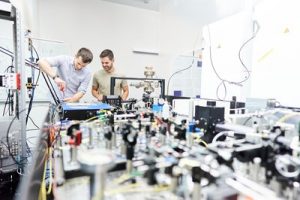March 25, 2024 — The Jülich Supercomputing Centre (JSC) at Forschungszentrum Jülich and the Siegen-based start-up eleQtron are together building a globally unique modular supercomputer consisting of a quantum module and a classical digital module.

The project is called EPIQ and is based on a development partnership for a trapped-ion quantum computer in North Rhine-Westphalia (NRW). eleQtron is developing a trapped-ion quantum computer whose qubits perform calculations using a revolutionary microwave control system invented at the University of Siegen. The project is being made possible by the dynamic modular integration technology developed at Forschungszentrum Jülich.
The Ministry of Culture and Science of the State of North Rhine-Westphalia is providing around €21 million in funding over a four-and-a-half-year period to EPIQ, a project that was born out of the quantum computing network “EIN Quantum NRW.”
In the EPIQ development partnership, the eleQtron quantum computer pilot system, which will feature up to 30 trapped ion qubits, will be built from the end of 2024. It will subsequently be integrated into the JUNIQ Jülich user infrastructure for quantum computing. The system is scheduled to be available to users from 2025 – in hybrid high-performance and quantum computing (HPC-QC) mode.
“The integration of the eleQtron system is already able to benefit from the broad user portfolio of the JUNIQ platform,” explained project manager Kristel Michielsen. “JUNIQ offers the unique opportunity to compare different quantum computer systems and concepts on one platform. The eleQtron quantum computer will serve as a reference for the classification of other systems.”
Prof. Astrid Lambrecht, Chair of the Board of Directors of Forschungszentrum Jülich, commented: “Developing a quantum computer and putting it into application together with a start-up from the region demonstrates NRW’s capabilities as a high-tech hub in Europe and also the effectiveness of the ‘EIN Quantum NRW’ network, through which the development partnership came about. The system is openly accessible to users from science and industry via the Jülich user infrastructure for quantum computing. Universities benefit from this system in their research and we are able to promote the transfer of quantum technologies to industry in NRW. In addition to access to quantum computers, technical support is also a crucial component. In this way, we are helping to strengthen the agile quantum computing community in North Rhine-Westphalia.”

In a second step, the pilot system will be developed into a gate-based quantum computer ready for series production with up to 60 qubits, integrated into JSC’s HPC systems, and will be used in hybrid mode in JUNIQ from 2026. As the name suggests, gate-based quantum computers use a sequence of quantum gates to manipulate the state of qubits and to thus perform quantum calculations. They can be used for a wider range of problems than quantum annealers and are therefore more versatile. The system is the first gate-based quantum computer that will go into scientific operation at Forschungszentrum Jülich.
The system will be used for optimization tasks in various industrial areas such as logistics, traffic optimization, and process engineering. The quantum computer will also be used in the basic sciences of physics and chemistry, biology and medicine, and materials research. Machine learning and the training of AI models are further promising fields of application.
Ions Strung Together Like a Pearl Necklace
The interaction between traditional digital high-performance computers and the emerging quantum computers is seen as having considerable potential for innovation worldwide. “Together with the Munich-based company ParTec, the Jülich Supercomputing Centre is a pioneer in the networked operation of various high-performance computing systems,” explains Thomas Lippert, head of JSC. “We are leaders in the development of modular integration technologies that are needed to couple future quantum computers and we are developing hybrid quantum HPC algorithms.”
Jülich’s partner is the start-up eleQtron. The Siegen-based company is a world leader in the design of quantum computers based on trapped ions. In this type of quantum computer, the qubits consist of ions in ion traps. “Individual ions are strung together like a pearl necklace by electromagnetic fields in a vacuum,” explains Jan Leisse, co-founder and CEO of eleQtron. “They are fully coupled – meaning they all interact with each other – and can be controlled via our unique microwave control system.” Unlike superconducting qubits, ion traps do not need to be cooled so much. This makes it easier to keep even larger quantum processors with large numbers of qubits at the required temperature.
Source: Jülich Supercomputing Centre

























































